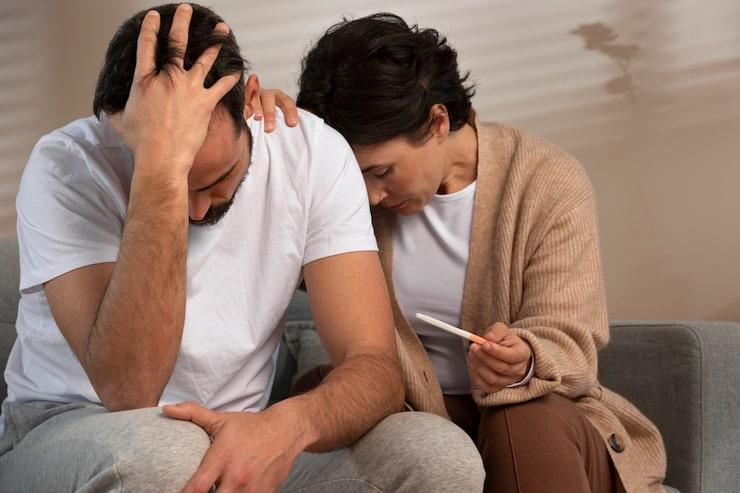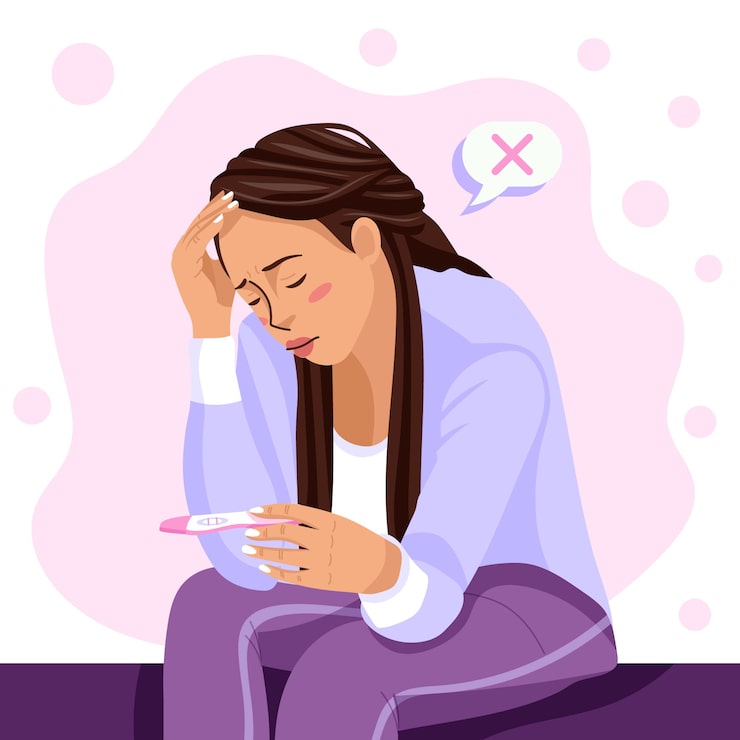
Couple depressed due to a miscarriage
People typically describe pregnancy as a journey filled with hope, joy, and excitement. But for some women and families, that journey is interrupted by a miscarriage, which can feel like too much to handle and crush their hearts.
Even though miscarriage happens a lot more often than most people think, many people still find it hard to talk about it openly. This quiet might make the grief feel worse. We can replace stigma with knowledge and compassion by learning more about miscarriage, such as why it happens, what indications to look for, and how to get help.
A miscarriage is when a woman loses her pregnancy before the 20th week. Most miscarriages occur in the first three months of pregnancy. A lot of the time, the pregnancy ends because it wasn't growing properly, which is usually because of random chromosomal problems.
This is one of the most crucial things to know: miscarriage is not usually caused by something the mother did or didn't do. Working, engaging in light exercise, or experiencing mild stress are all everyday activities that don't cause pregnancy loss.
Many people don't realize how common miscarriage is. It happens in roughly 10–20% of known pregnancies.
The real rate is probably greater because a lot of miscarriages happen very early, sometimes before a woman even knows she's pregnant.
The danger decreases significantly by the second trimester of pregnancy.

woman suffering from a miscarriage
There isn't always one clear cause. There are still some recognized things that make the risk higher:
1. Chromosomal Abnormalities
Most early miscarriages happen because the embryo has genetic abnormalities that stop it from growing normally. These problems occur by coincidence, not because of the parents' genes.
2. The Mother's Health Conditions
Some health problems can make miscarriage more likely, such as:
Diabetes that isn't under control
Problems with the thyroid
Polycystic ovarian syndrome (PCOS)
Lupus and other autoimmune diseases
Nasty infections
3. Issues with the cervix or uterus
Abnormalities in the uterus (such fibroids or a septum)
A cervix that opens too soon (cervical insufficiency)
4. Your way of life and the place you live
Using drugs, smoking, or drinking a lot of alcohol
Very bad malnutrition
Being around dangerous substances or radiation
5. Age of the mother
The risk of miscarriage rises with age, especially above 35.
There are some typical indicators of miscarriage, however not all of them are the same.
Doctors sometimes put miscarriages into distinct groups:

Distressed couple due to miscarriage
If a miscarriage is suspected, doctors may suggest:
The type of miscarriage and the woman's health will affect how it is handled.
1. Natural (Expectant) Management
The body naturally eliminates the pregnancy tissue over the course of several days or weeks.
2. Medicine
Some medicines can help the uterus get rid of the last bits of tissue faster.
3. Surgery
Sometimes, a technique called Dilation and Curettage (D&C) is used to remove tissue from the uterus. This is especially true if there is a lot of bleeding, an infection, or if a woman wants things to get better faster.
They may also prescribe antibiotics and painkillers when needed.
A miscarriage is not just a physical thing; it's also an emotional one. Women may experience a range of emotions, including loss, remorse, wrath, sadness, or melancholy. A lot of people blame themselves, even though miscarriage is not usually their fault.
Emotional support is equally as vital as physical care. Therapy or counseling can help you manage your feelings in a safe and supportive environment.
Support groups bring together women and families who are experiencing similar challenges.
Getting partners and loved ones involved helps ensure that everyone who needs aid receives it.
It takes time to heal, both physically and mentally. Here are some things you may do that might help:
1. Is it possible to stop a miscarriage?
Not all the time. You can't eliminate hereditary reasons, but you can minimize your risk by maintaining a healthy lifestyle, receiving regular medical care, and avoiding substances that are harmful to your health.
2. When is it okay for me to try to get pregnant again?
Doctors may tell you to wait until after one or two menstrual cycles, but the best time to do it depends on how well you are healing physically and emotionally.
3. If I've already had one miscarriage, does that make it more likely that I'll have another?
No. Most women who experience one miscarriage go on to have healthy pregnancies. If you have had many miscarriages, you may need more tests.
4. Is it possible for stress to trigger a miscarriage?
Stress that happens every day does not induce miscarriage. Extreme or long-term stress may have a negligible effect when paired with other risk factors.
5. Should I go to the doctor after a miscarriage?
Yes. Even after a first miscarriage, it's crucial to have medical attention to make sure you're fully healed and to get advice for future pregnancies.
One of the saddest things a woman and her family may go through is a miscarriage. However, most people are unaware that it occurs much more frequently than they realize. Knowing why it happens, being able to recognize the signs, and seeking medical and emotional support through experienced doctors like the ones at Prakash Hospital,Noida, can make the trip a little less lonely.
Above all, you shouldn't go through a miscarriage alone. Healing is achievable with the correct treatment, compassion, and support. Many women still have hope for a healthy pregnancy in the future.
We offer expert care across key specialties, including Medicine, Cardiology, Orthopaedics, ENT, Gynaecology, and more—delivering trusted treatment under one roof.
Prakash Hospital Pvt. Ltd. is a 100 bedded NABH NABL accredited multispecialty hospital along with a center of trauma and orthopedics. We are in the service of society since 2001.
OUR SPECIALITIES
Contact Us
D – 12A, 12B, Sector-33, G. B. Nagar, Noida, Uttar Pradesh 201301
+91-8826000033

© 2026 All rights reserved.
Designed and Developed by Zarle Infotech